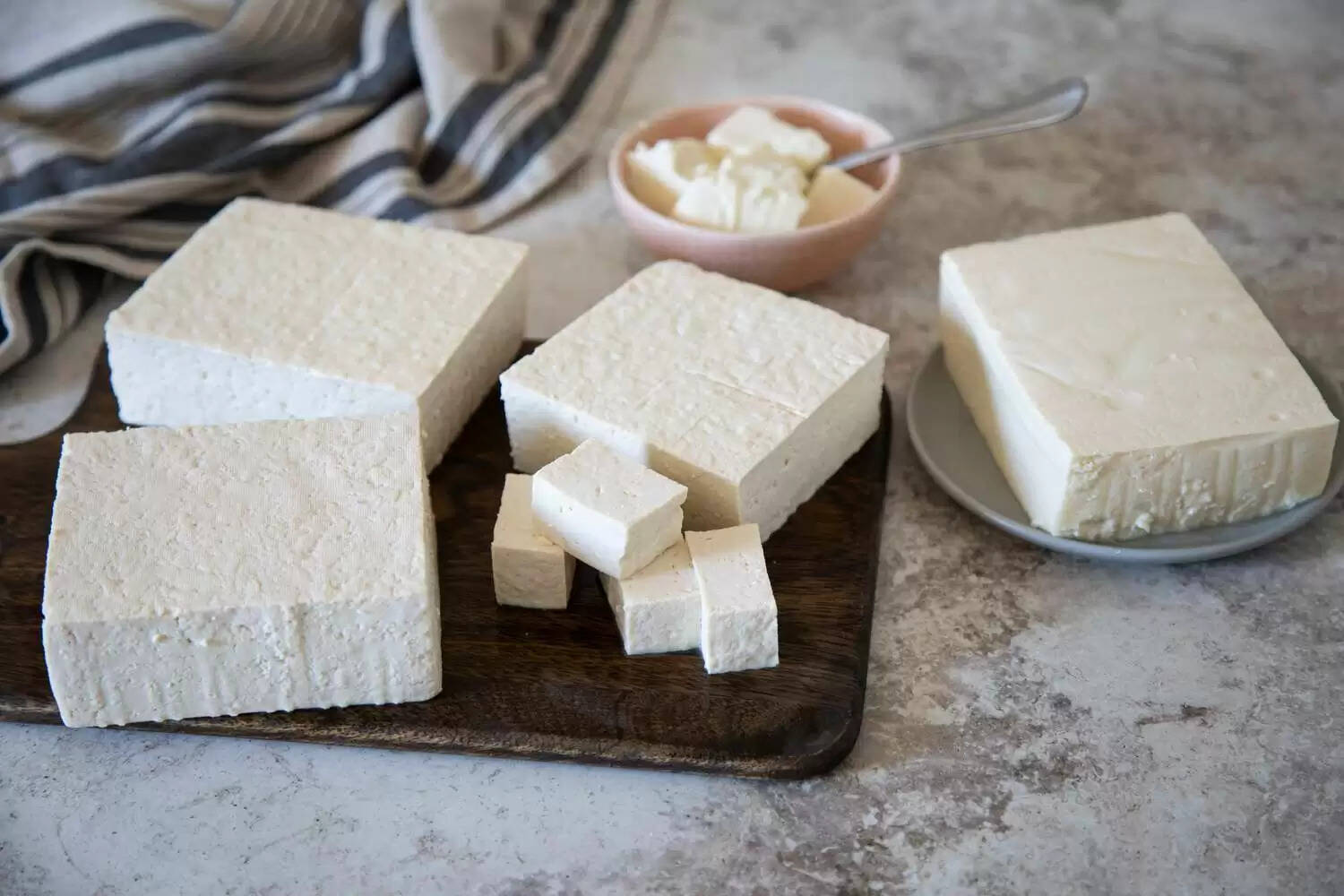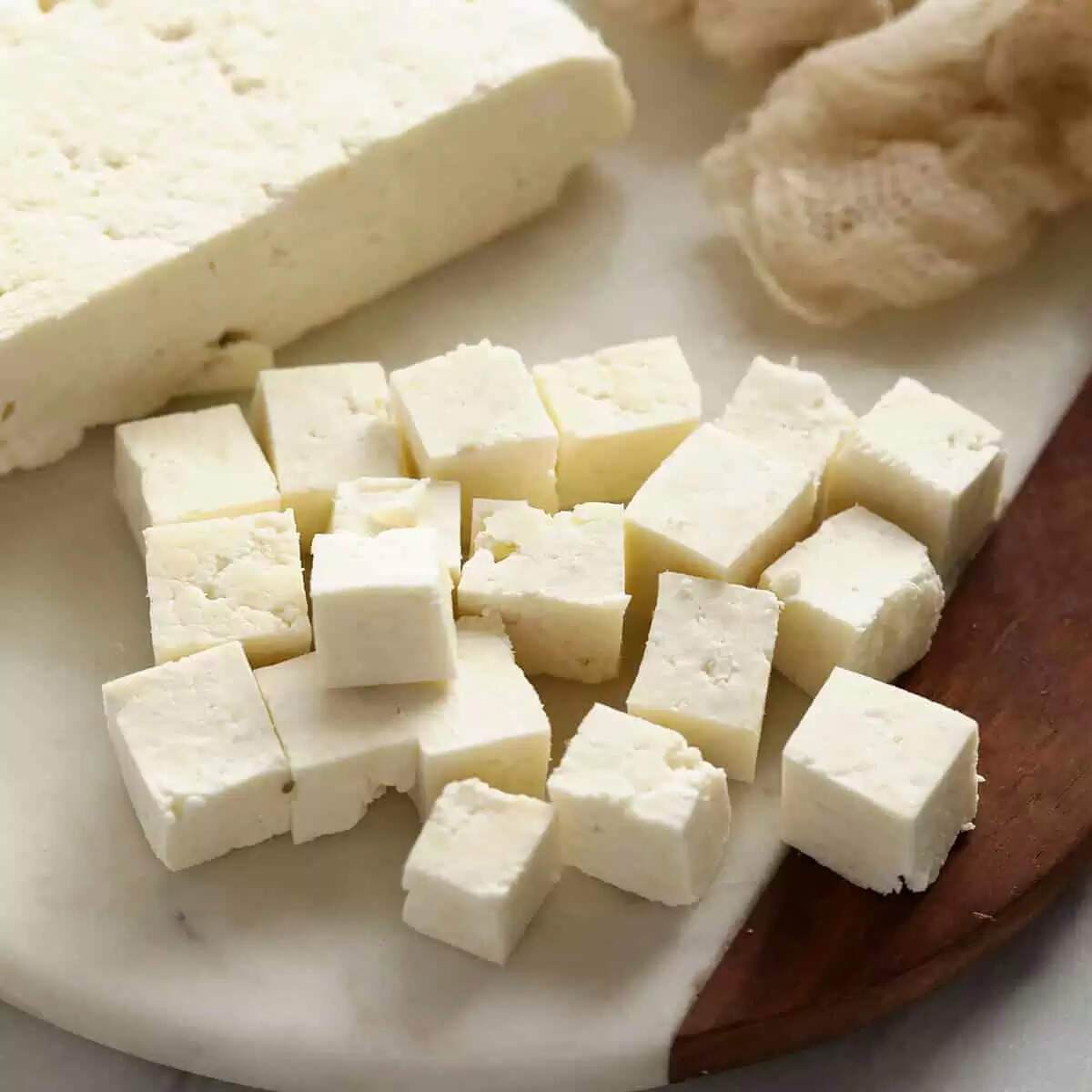Paneer Vs Tofu - Which One Is Better & Why Explained

What is tofu?
Tofu, a solid white block made by coagulating fresh soya milk and pressing the resulting curds, is a form of soybean curd.
Originating in China over 2,000 years ago, tofu has become a widely consumed food worldwide, appreciated across various cultures and cuisines. Particularly popular in East Asia, it has gained global recognition.
In modern times, tofu is renowned as a nutritious and protein-rich substitute for meat, making it a favored choice among vegans, vegetarians, and those aiming for a healthier way of living.

How is tofu made?
Tofu is created through a process involving grinding soybeans in water, followed by heating and allowing the liquid protein to coagulate. Coagulation is responsible for thickening or solidifying the liquid, resulting in the formation of curds. These curds are then pressed together to create a solid block or cake.
Tofu is available in different textures, including regular, silken, firm, and extra-firm. Each texture serves specific purposes, with some being more suitable for cooking while others are enjoyed raw. Regardless of the texture, all types of tofu offer delightful flavors.
What is tofu made of? What does tofu taste like?
Tofu is derived from soya milk that undergoes a process to create a solid white block rich in protein.
This versatile food item has a soft and mildly creamy texture, making it a delightful addition that enhances the taste and texture of various dishes.
What is paneer? What is paneer made of?
Paneer is a type of Indian cottage cheese that is made from either whole-fat cow's milk or buffalo milk. Unlike aged cheeses, paneer is a non-aged variety.

Tofu and paneer similarities
Paneer and tofu indeed share certain similarities. Both are white blocks commonly used in various Asian cuisines, and they can be cut into cubes or slabs and cooked in a variety of ways. They also possess a mild flavor and have the ability to absorb the flavors of the dishes they are prepared with.
However, it is important to note that paneer and tofu are distinct foods with notable differences. While tofu is made by curdling and pressing soya milk, paneer is made from either whole-fat cow's milk or buffalo milk through a similar curdling and pressing process. Paneer is commonly associated with Indian cuisine, while tofu has its origins in East Asia.
Additionally, there are differences in their textures and nutritional profiles. Paneer has a softer and creamier texture compared to tofu, which can have a range of textures from soft to firm. In terms of nutrition, paneer is a rich source of protein and calcium, while tofu is known for its high protein content and is often considered a good meat substitute for vegetarians and vegans due to its plant-based origin.
While paneer and tofu may be confused due to their similar appearances and cooking applications, it is important to recognize their distinct characteristics and culinary traditions.
Tofu and paneer differences
The primary distinction between paneer and tofu lies in their origins and composition. Paneer is a cheese variety originating from India, while tofu is a soybean-based curd with Chinese origins.
Another significant difference is that paneer is derived from animal products, specifically whole-fat cow's milk or buffalo milk. On the other hand, tofu is entirely plant-based, making it suitable for both vegans and vegetarians.
Tofu offers a wide range of textures, which vary based on the amount of liquid extracted during the coagulation process of soybeans. This versatility enables tofu to be used in a broad spectrum of dishes, from desserts to savory preparations.
Is tofu healthier than paneer?
Indeed, when comparing tofu and paneer from a nutritional standpoint, tofu tends to have lower calorie, fat, and carbohydrate content, while being higher in fiber, calcium, iron, and potassium. Moreover, tofu is cholesterol-free and does not contain lactose, making it suitable for individuals with lactose intolerance.
It is interesting to note that a significant portion of the Indian population, around 60 to 65 percent, is lactose intolerant, further emphasizing the potential benefits of tofu as a dairy-free alternative.
As a complete plant-based protein source, tofu provides essential amino acids necessary for muscle maintenance, weight management, and meeting daily protein requirements for vegans, vegetarians, and individuals in general.
Tofu's isoflavones, which are not found in paneer, are compounds that have been associated with potential health benefits. Consuming isoflavone-rich foods like tofu may contribute to the prevention of certain diseases such as heart disease and diabetes. Additionally, they might help reduce the risk of osteoporosis and some types of cancers.
Considering these factors, tofu can indeed be regarded as a healthier option compared to paneer.
Can paneer be replaced with tofu?
Certainly! Firm or extra-firm tofu can be used as a suitable substitute for paneer, as the taste and texture differences are minimal.
For those who follow a vegan diet and desire a plant-based alternative to paneer, there are options available such as soy-free and gluten-free vegan paneer made from ingredients like cashews and almonds.
You can explore various recipes like butter paneer masala or palak paneer that utilize this vegan paneer substitute. Give it a try and enjoy a delicious plant-based twist on traditional dishes!
Which is better, paneer or tofu?
Tofu can indeed be considered a healthier option compared to paneer. It offers higher levels of essential nutrients like calcium, iron, and fiber, while having lower fat content and fewer calories. Additionally, tofu contains compounds known for their potential in fighting cancer.
In terms of taste, tofu has a notable advantage as it has a greater ability to absorb flavors compared to paneer. While both tofu and paneer can absorb the flavors of the ingredients, sauces, and seasonings they are cooked with, tofu tends to do it more effectively, resulting in a tastier protein option.
From an ethical standpoint, tofu can be seen as a kinder choice. Paneer production involves using cow's or buffalo's milk, which often requires lactating animals. Once these animals reach their peak milk production, they may be subjected to cruel practices such as slaughter or abandonment. In contrast, tofu is made from soybean milk, which does not involve the killing of animals or separating calves from their mothers for milk extraction. Moreover, tofu production generally requires fewer resources, making it more environmentally friendly.
Considering health, taste, and ethical considerations, tofu emerges as a favorable choice over paneer.
What is the difference between paneer and soya paneer?
Soya paneer is an alternative term for tofu. While paneer is made from curdled animal-based milk, soya paneer or tofu is made from the curd of soy milk. The distinction in their production methods and ingredients results in different characteristics and nutritional profiles between the two.
Is tofu easy to find in india?
Indeed, the demand for tofu is experiencing an upward trend in India, primarily driven by an increasing health consciousness among consumers. As people become more aware of the nutritional benefits and versatility of tofu, its popularity has grown.
Urban areas in India tend to have a higher availability of tofu compared to rural regions. This is mainly due to factors such as increased access to imported ingredients, a larger market for international cuisines, and the presence of specialty stores or supermarkets catering to diverse dietary preferences.
Furthermore, the affordability of tofu has contributed to its rising demand. Tofu is often priced reasonably, making it an accessible option for a wide range of consumers.
Overall, the combination of health awareness, urbanization, and affordability has led to the growing popularity and increased availability of tofu in India.

